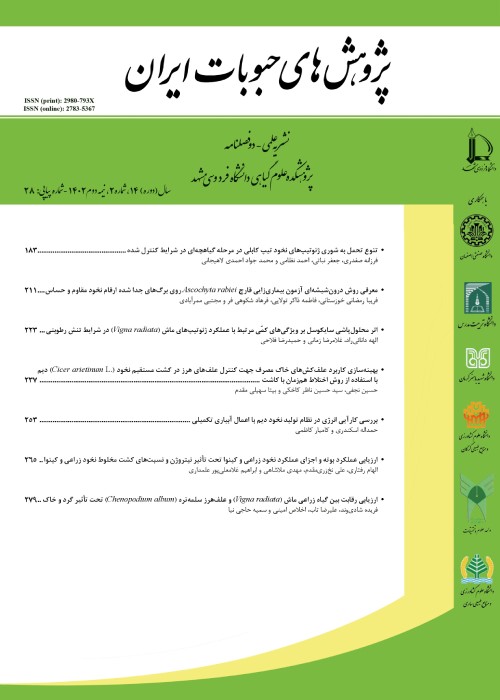The effects of night temperature and nitric oxide on some physio-biochemical characters of Pea plants
Author(s):
Abstract:
Introduction
Plant responses to environmental stress have a central role in agricultural production. Responses results from events occurring at all levels of the organization, from biochemical reactions in cells to whole plant physiology. Many plants are injured when exposed to low non-freezing temperatures. However, data on the effects of night temperatures are scarce. On the other hand, nitric oxide (NO), as a plant growth regulator, has an important role in ameliorating stress induced damage in plants. Therefore, the aim of this work was to evaluate the role of NO during low temperature nights. In this research the changes in some physio-biochemical characters of Pea plants under NO and night temperature treatments were studied.Materials And Methods
The fresh weights of roots and shoots, the contents of proline, soluble and insoluble sugars, ascorbic acid, and the activities of ascorbate peroxidase and polyphenol oxidase were evaluated. Seeds of chickpea, Cicer arietinum L. ILC482 variety were surface sterilized in sodium hypochlorite solution 1%, rinsed with sterilized water and germinated on moist filter papers in the dark for four days. Seedlings were transferred to plastic pots containing half-strength Hoagland solution, and were placed at 14 h photoperiod. Plants aged 14 days were randomly subdivided into two groups. One group received half-strength Hoagland solution (control) and another group was subjected half-strength Hoagland solution containing NO (0.1mM) for two days. Then, plants divided into three groups and, for 3 days, were subjected to 25/25, 25/15 and 25/5 ºC (day/night) regimes. After two days, shoots and roots were weighted for recording fresh weights. For assay of proline content, aliquots of fresh tissues were homogenized in 3% sulphosalicylic and centrifuged. Free proline contents were quantified using ninhydrin reagent and expressed as μmol/g FW. The total soluble sugars were determined by anthrone reaction at 625 nm in an 80% hot ethanol extract and expressed as mg/g FW. Later insoluble sugars were extracted from residues with HCl and determined by Anthrone reaction. In assay of ascorbate contents, 6% trichloroacetic acid extracted leaf tissues were mixed with 2,2-dipiridil. Then, for reduction of Fe3 to Fe2 by ascorbic acid mixture was incubated at 42 ºC and the absorbance values were recorded at 525 nm. Data expressed as μmol/g FW. For Enzyme assays, aliquots of fresh leaves were ground in cold extraction 100 mM phosphate buffers (pH 7.5) at 0-4 °C. After centrifugation of homogenates, enzymes assays were performed in the supernatant at 25 °C. Ascorbate peroxidase activity was measured by following the oxidation of ascorbate at290 nm. The Activity of Polyphenol oxidase in presence of pyrogallol was determined by measuring the increase in absorbance at 420 nm. The experiment was arranged in a completely randomized design with four replicates. The data were statistically analyzed by using Duncan's multiple range test to separate the means at p ≤ 0.05.Results And Discussion
The fresh weights of roots and shoots, the contents of proline, soluble and insoluble sugars, ascorbic acid, and the activities of ascorbate peroxidase and polyphenol oxidase were evaluated. The results showed that nitric oxide pretreatment had a significant effect on the fresh weight of shoots, proline and soluble sugars contents, and polyphenol oxidase activity. Changes of night temperature were effective on all of the examined factors except shoots fresh weights. Interaction between nitric oxide and the temperature had a significant effect on fresh weights of roots and shoots, proline and soluble sugars contents, and ascorbate peroxidase activity. Data showed that maximum growth of plants occurred at 15 °C night temperature in the presence of NO. Proline contents of leaves were significantly decreased by falling night temperatures. NO treatments led to more reduction in proline under low night temperatures. In higher plants, proline is normally accumulated in response to stress factors. Night temperature reduction and NO treatment, probably, can act as signal for decreasing proline biosynthetic enzymes activities or for increasing proline degradative enzymes activities. Both soluble and insoluble sugars were increased significantly by falling night temperatures, and NO treatments had a positive effect. We can assume that falling of night temperatures can affect tissues metabolism, for preventing of damages, by accumulation of sugars. Falling of night temperatures increased ascorbate contents of leaves. Generally, ascorbate has antioxidative properties and high levels of foliar ascorbate can offer tolerance to plants under unfavorable conditions. Ascorbate peroxidase plays an important role in the metabolism of H2O2 in higher plants. In this study, falling of night temperatures led to decrease in the enzyme activity. However, enzyme activity increased significantly with the NO treatment at 5 °C. Ascorbate peroxidase activity is directly involved in the protection of plant cells against unfavorable environmental conditions.Conclusion
In conclusion, falling night temperatures can significantly affect some biochemical markers of plants. The changes in roots and shoots are not showing the same patterns. Under low night temperatures, NO treatment can induce non enzymatic (ascorbate) and enzymatic (ascorbate peroxidase) defense systems for overcoming the deleterious effects of low temperature.Keywords:
Language:
Persian
Published:
Iranian Journal of Pulses Reseach, Volume:7 Issue: 1, 2016
Pages:
93 to 104
magiran.com/p1600463
دانلود و مطالعه متن این مقاله با یکی از روشهای زیر امکان پذیر است:
اشتراک شخصی
با عضویت و پرداخت آنلاین حق اشتراک یکساله به مبلغ 1,390,000ريال میتوانید 70 عنوان مطلب دانلود کنید!
اشتراک سازمانی
به کتابخانه دانشگاه یا محل کار خود پیشنهاد کنید تا اشتراک سازمانی این پایگاه را برای دسترسی نامحدود همه کاربران به متن مطالب تهیه نمایند!
توجه!
- حق عضویت دریافتی صرف حمایت از نشریات عضو و نگهداری، تکمیل و توسعه مگیران میشود.
- پرداخت حق اشتراک و دانلود مقالات اجازه بازنشر آن در سایر رسانههای چاپی و دیجیتال را به کاربر نمیدهد.
In order to view content subscription is required
Personal subscription
Subscribe magiran.com for 70 € euros via PayPal and download 70 articles during a year.
Organization subscription
Please contact us to subscribe your university or library for unlimited access!



